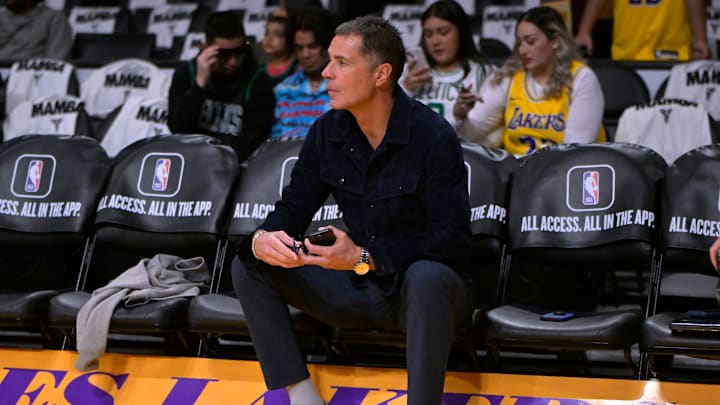The Los Angeles Lakers are seemingly beginning to adapt to the unavoidable nature of the modern NBA. General manager Rob Pelinka is looking for a head coach who thrives in developing talent while also taking it upon himself to prioritize depth over star power in free agency.
As crucial changes are made to the general approach to team-building, however, there's one glaring flaw that could still prove to be the Lakers' undoing: Scouting.
Identifying talent is perhaps the most important job that a front office is faced with. Finding promising players who can be acquired through the NBA Draft is a vital role that a general manager must be able to play, as is having the foresight to see which current pro-level players could thrive in your jersey.
According to Eric Pincus of Bleacher Report, the Lakers differ from other NBA teams in one of those two areas: They don't have scouts watching the talent around the Association.
"Outside of the scouting department for the draft, L.A. doesn't have scouts spread throughout the league watching NBA talent on a nightly basis in person like other franchises."
It's essential to be able to identify players who are coming up through the Draft, but a scouting department that isn't identifying diamonds in the rough in the NBA is only doing half of its job.
Lakers have the right intention, but the wrong course of action
Signing or trading for star-caliber players is an obviously great way to improve a team's chancs of winning a championship. It's an approach that has worked out under Pelinka, with Anthony Davis being the marquee acquisition who helped Los Angeles win the title in 2020.
Salary cap rules have changed, however, and the star-chasing route is now a guaranteed path to a glaring absence of depth.
In the past, that approach has proven fruitful for several franchises, with LeBron James often at the heart of them. Depth is more valuable than ever before, however, as the four Conference Finalists in the 2024 NBA Playoffs have consistently proven.
Yet, Los Angeles' commitment to building a deeper roster seems to lack the most essential ingredient: The scouts who can identify the type of players who can enhance a rotation.
It's simple enough to look at a box score and see who's producing, but great teams can identify ideal characteristics beyond a player's statistics. The right scouting team can recognize the impact of playing time restraints and even a poor fit, and prioritize a player's strengths and weaknesses—or, conversely, pinpoint how misleading a productive player's statistics might be.
By not having scouts whose job it is to accomplish that feat with current NBA talent, the Lakers are robbing themselves of a proven path to success.
Great teams find diamonds in the rough
The 2024 Conference Finals were Exhibit A of how important it is to determine which players fit better than the general public might expect. Each of the four teams that reached the NBA Semifinals have excelled in that regard.
That all begins with the Boston Celtics, which took chances on the likes of Jrue Holiday, Kristaps Porzingis, and Derrick White, with the 7'3" center being perhaps the biggest risk of all.
Porzingis spent the better part of the past two seasons with the Washington Wizards, with the team going 35-47 in both of his campaigns. As such, trading Marcus Smart, who was just one season removed from winning Defensive Player of the Year, for Porzingis was a massive risk.
As the 2024 NBA Finals approach Game 3, however, Porzingis' fit and impact has been undeniable, with his performance in Game 1 all but sealing the win by halftime.
The NBA Finalist Dallas Mavericks took similar gambles on Daniel Gafford and PJ Washington, who had been playing for the lowly Wizards and Charlotte Hornets. The Minnesota Timberwolves acquired Mike Conley at a time when he was posting the second-worst field goal percentage of his career on a middling Utah Jazz team.
The Indiana Pacers took a similar chance on Aaron Nesmith, who averaged 3.8 points per game the season prior to joining his current squad. Perhaps to a lesser degree of risk, Indiana also went all-in on a soon-to-be 30-year-old Pascal Siakam who hadn't been to the playoffs in two seasons.
Considering those teams were the last four standing this postseason, the value of a scouting department that can search for hidden gems is invaluable. Those players not only bring value to the team but often play on affordable contracts.
If the Lakers truly want to adapt to the modern NBA, then the first priority must be hiring staff to scout players who are currently in the Association.
Every contender in 2023-24 has proven how vital that ability is.
